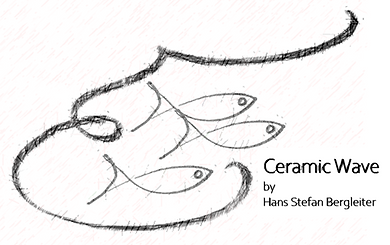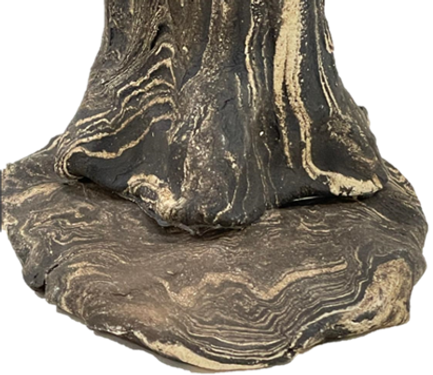
Ceramic Wave © for sale currently under this link to my Etsy shop: https://hsbceramicwave.etsy.com
Ceramic Wave © Plant Pots




The three feet (fun fact: a thing with three feet always stands firmly :))
The Plant Pots are great for cultivating a variety of plants on limited space, allowing easy re-arranging and exchange.
The pots are each slightly unique in coloration and shape, so that an assembly of them gives an harmonic impression and never gets boring.
The "pots with feet" have three handmade ceramic feet (s. photo) firmly fixed with aquarium silicone to the bottom. This allows shrimps and snails to forage underneath the pots.



Ceramic Wave © Snail Caves

The Ceramic Wave © Snail Caves are a classic and perfectly highlight the color, shape and texture of RockWood ceramics.
They are made specially for shrimp and crayfish, but also cave-breeding dwarf cichlids like them.
The combination of different sizes creates a particularly harmonious impression.
Ceramic Wave © Cylinder Caves


The Cylinder Caves are designed for cave-breeding catfish and cichlids. The inside is smooth, but the outside rough, thus resembling a hollow log.
They can easily be stapled, resting firmly due to their rough outer surface.



Ceramic Wave © Moebius Coil Modules

A Moebius Coil is a somewhat mysterious geometric body, having only one side and one edge.
Two to five of the Moebius Coil Modules piled on each other make a fascinating eyecatcher and provide a fine playground or hiding space for shrimp and small fish, such as Dario.
Piling high is very easy due to the rough outer surface. I also do them in plain black, looking quite spacy.

Ceramic Wave © Tagliatelle Modules
Even a single Tagliatelle Module provides a multitude of options for placement and alignments and provides shelter and foraging ground for shrimp and small fish.
A very tempting option is to pile up a
number of them, which is very
easy due to their irregular shape.
Thus, an entire reef landscape is
created.


Ceramic Wave © Dead Upright Tree
An impressive eyecatcher, practically indistinguishable from a natural specimen.
A proud, hollow tree veteran, standing firmly on a solid base plate.



Ceramic Wave © Tree Stumps
Remnants of a sunken forest, both varieties of hollow tree trunks are made to stand upright and may be planted, e.g. with Bucephalandra


Tree Stumps standing on roots


Tree Stumps flat
Ceramic Wave © Substrate


The Ceramic Wave © Substrate - the typical marbled RockWood mixed clay broken into pieces before firing (afterwards it is too hard) - gives a nice "salt and pepper" effect. It can be used e.g. as a top layer on the plant pots or in a shrimp tank without deep soil. The particles are quite light and can easily be manipulated by shrimp.
Due to the shape of the particles, it provides an extremely good ventilation and avoids oxygen-free zones in the substrate.
It is not suitable for Corydoras catfish or other fish that dig in the ground.